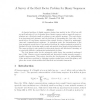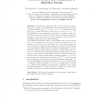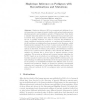5 search results - page 1 / 1 » Greedy-type resistance of combinatorial problems |
DISOPT
2006
13 years 4 months ago
2006
This paper gives a sufficient condition for a combinatorial problem to be greedy-type-resistant, i.e. such that, on some instances of the problem, any greedy-type algorithm will o...
SETA
2004
Springer
13 years 10 months ago
2004
Springer
A classical problem of digital sequence design, first studied in the 1950s but still not well understood, is to determine those binary sequences whose aperiodic autocorrelations ...
CRYPTO
2007
Springer
13 years 11 months ago
2007
Springer
Abstract. We study the natural problem of secure n-party computation (in the passive, computationally unbounded attack model) of the n-product function fG(x1, . . . , xn) = x1 · x...
FM
2006
Springer
13 years 8 months ago
2006
Springer
Abstract. The key to the integration of formal methods into engineering practice is education. In teaching, domain-independent problems -i.e., not requiring prior engineering backg...
WABI
2010
Springer
13 years 3 months ago
2010
Springer
Abstract. Haplotype Inference (HI) is a computational challenge of crucial importance in a range of genetic studies, such as functional genomics, pharmacogenetics and population ge...



